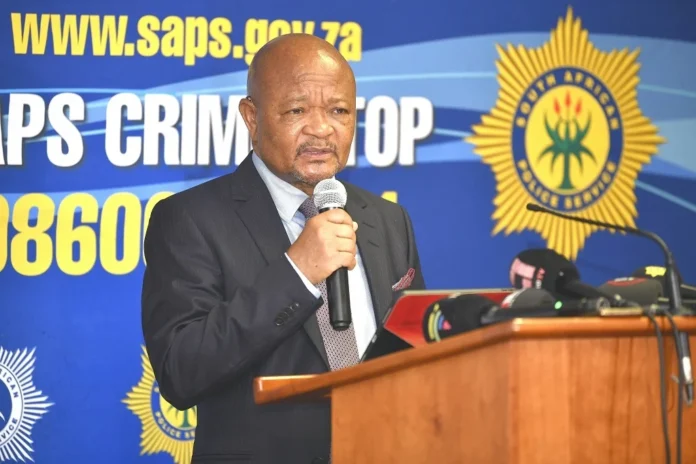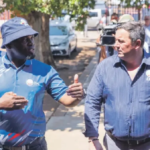Suspended police minister Senzo Mchunu has lodged a complaint regarding the conduct of advocate Norman Arendse, the evidence leader of the parliamentary ad hoc committee investigating allegations of abuse of power and corruption within the criminal justice system. Mchunu claims Arendse has displayed hostility towards him during his testimony.
Speaking to the Sunday Times after his second day of giving evidence on Friday, concerning allegations made by KwaZulu-Natal police commissioner Lt-Gen Nhlanhla Mkhwanazi, Mchunu expressed his belief that Arendse's constant interruptions were preventing him from adequately answering questions. He stated that he had raised this concern with committee chair Soviet Lekganyane, who had promised to investigate the matter.
Mchunu is scheduled to face intense scrutiny from MPs this week regarding his allegedly unlawful decision to disband the political killings task team (PKTT), a decision that was apparently not sanctioned by either President Cyril Ramaphosa or the interministerial committee (IMC) established to oversee the matter. There are also allegations that his decision to dissolve the PKTT was motivated by a desire to protect criminal syndicates.
The former police minister clashed with Arendse on several occasions while being questioned about the disbandment of the PKTT. On one occasion, Mchunu objected to Arendse's assistant engaging with the advocate while he was responding to questions.
“Now your assistant keeps on engaging you when I speak; when you speak, she doesn’t engage you. I don’t engage with anyone,” Mchunu stated. “The impression I’m getting is that my response is not important, but what you say to me is important, and I have a problem with that.” Arendse subsequently apologised.
Mchunu later accused Arendse of attempting to portray him as having acted illegally by failing to brief national commissioner Fannie Masemola, Mkhwanazi, and suspended crime intelligence head Lt-Gen Dumisani Khumalo before issuing the directive to disband the PKTT.
This accusation arose after Arendse questioned Mchunu on whether he should have informed the trio in advance, given their significant involvement in the running of the PKTT. Mchunu responded: “I have indicated that I didn’t breach any law. I want us to have an agreement or a consensus that I didn’t convene a meeting with General Masemola, General Mkhwanazi and General Khumalo [and that] doesn’t constitute an offence in the department or anywhere or in the state. It doesn’t. That’s why I talk about … don’t impose a feeling of guilt just because I didn’t have a meeting with them. It doesn’t work like that.”
Another point of contention between Mchunu and Arendse was whether or not President Ramaphosa had agreed with his decision to disband the PKTT. Arendse argued that, given the brevity of Mchunu's briefing to Ramaphosa – which occurred after the PKTT had already been disbanded – there was no opportunity for the president to either agree or disagree with the decision.
Mchunu explained: “It was a short briefing with the president. It was a briefing, it wasn’t a discussion, to say I at some point took this decision last year December. All I remember is that I did say there are matters that I have developed a very serious concern about, and I said to him these matters, among others, have led me to disband the PKTT, and that possibly at some point, if I didn’t do this, there may have been a call for a commission on those matters."
“So I decided that I would pre-empt any need for such a call at some point, and I did this, and that was one of the things I mentioned during the short briefing.”
Arendse then questioned why Mchunu had stated that Ramaphosa agreed with him if the briefing was so short. “What should I say?” an agitated Mchunu responded.
“It sounds to me that you conveyed what you did to the president; the president heard what you had to say, and basically noted it,” Arendse said. “An agreement means two or more people discuss something, they put whatever is on the table that requires an agreement, they engage, and they say, ‘Okay, fine.’ Here it sounds like there was no agreement; you informed him of your decision.”
ANC MP Xola Nqola intervened, telling Mchunu that it was crucial to establish whether the president had agreed or not, which was why Arendse was focusing on the matter. EFF leader Julius Malema added that determining Ramaphosa's agreement would be critical later on.
Mchunu reiterated: “The answer in the affidavit is that I briefed the president; he agreed with the briefing I gave him.”
Mchunu explained to the committee that he had unilaterally decided to disband the PKTT because the IMC on political killings had ceased to exist at the end of the sixth administration, preventing him from having discussions with them. However, senior government officials have disputed this claim, asserting that many IMCs from the sixth administration were reconstituted in the seventh administration.
One official pointed out that, as chair of the IMC on political killings, Mchunu was responsible for ensuring the IMC was reconstituted. The parliamentary ad hoc committee will continue its investigation this week, with Mchunu expected to face further questioning on these and other related matters.

Follow Us on Twitter











